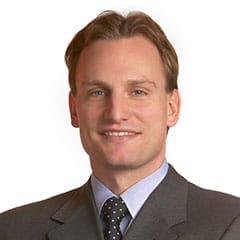Like many successful people in the private equity space, Jason Wright acknowledges that it was a little bit lucky for him to find his way to his present position. After Tufts University, he was a computer programmer at Accenture. Only a year into this career, though, he realized it wasn’t his “true calling.” It was a rotation at GE Capital that led him to GE Ventures. Connections were made, and when Wright was attending Wharton, a former senior GE colleague went to Apax and recruited him. During his second year of School, Wright began working at the sector-specific private-equity fund with its focus on large buy-outs—in Wright’s case, technology and telecommunications.
WHARTON MAGAZINE: Name a favorite memory in your career.
JASON WRIGHT: Two deals I would point to. One was more of a growth deal, which was RealPage, which we invested $30 million and ended up taking out $300 million. When we invested in it, it was a private small company back in 2004 and today it is a public company, more than 10 times the size. It was one of those deals that you see it from beginning to end over 10 years.
Then TIVIT, the first deal we’ve done in Brazil. It was the first large take-private done by private equity in Brazil. Just learning that culture and spending so much time in Brazil with the management team has been an incredible learning experience for me as well.
WM: How did you get into the business?
WRIGHT: Like many careers, it was a little bit fortuitous. It certainly was not planned. I started my career as a computer programmer. After doing that for a year, I realized it wasn’t my true calling. I went into GE management development program, and one rotation was in the GE Venture Capital Group. One of the senior guys in the GE venture group left and went to Apax while I was at Wharton, and he recruited me. I started my second year at Wharton.
I went from venture to growth to buyouts. So there have been new challenges along the way in terms of the size and types of deals that I’ve been doing. Apax has evolved too. When I first got here, we were a balanced fund and now we do just large transactions.
WM: What have you learned along the way?
WRIGHT: I think we’ve learned you have to be tuned into cultural differences. What works in the U.S. doesn’t necessarily work in Brazil. The only way to learn is to spend a lot of time in a local market. There are risks that we knew about going in that we’re now more attuned to: currency swings, the volatility in the geopolitical and political environments.
WM: What’s been your favorite aspect of the business?
WRIGHT: That we’re constantly learning, that every deal is so different. I am in the tech sector, but every company that we’re investing in is in a different niche. No one is an expert in all of these niches. So you have to learn about all these niches very quickly.
WM: What’s your investment strategy for the current climate?
WRIGHT: We have a very strong equity market, a red-hot debt market and a lot of capital on the sidelines. In this environment, we’re seeing prices for a lot of assets bid up. We need to be more creative and hustle to find those unique opportunities that fit our investment themes. That includes consolidation plays, transactions in emerging markets, and finding companies that need capital for growth and undermanaged assets that we can optimize.
Read the other “Pride of Private Equity” alumni profiles, as well as watch the video interviews with student leaders, here.
























